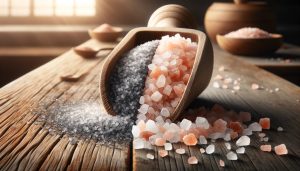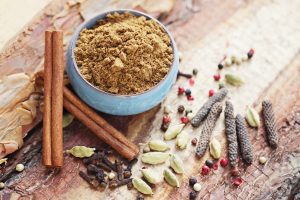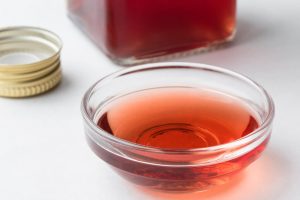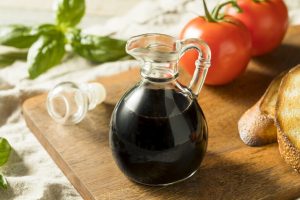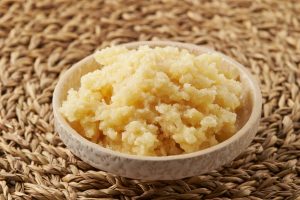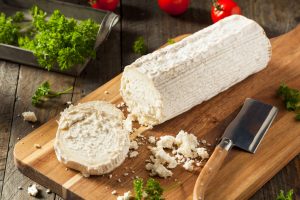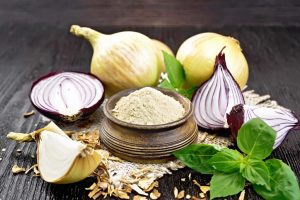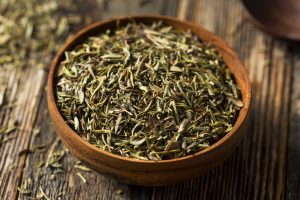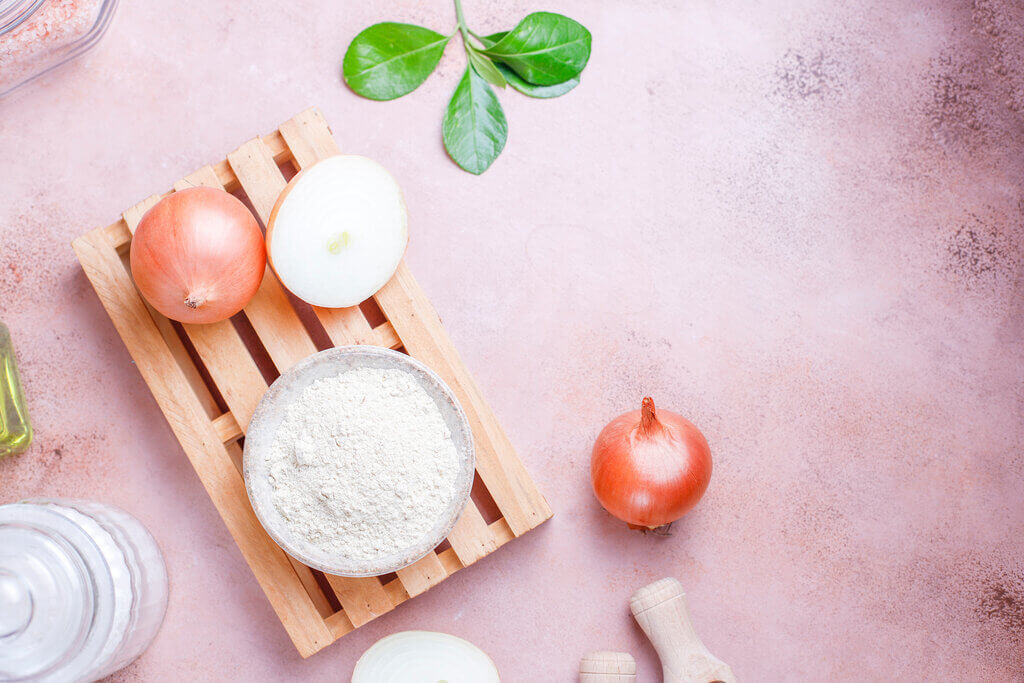
Didn’t notice that you ran out of onion bulbs in your kitchen after whipping up delicious meals day after day? As an essential ingredient in most of our favorite dishes, the absence of onions can be concerning. Fret not! If it’s a hassle to run to the nearest store, you can look for substitutes in your pantry. Fortunately, you can easily replace fresh onions with dehydrated varieties such as onion powder or even onion flakes and still get the same aromatic and savory punch.
If you have said alternatives at home, we saved you the tears with an easy onion to onion powder conversion in this article. Also, read about the differences between onion powder and fresh onion and how you can make your homemade onion powder below!
Onion vs Dehydrated Onion
Onions are complex in taste and lend a variety of flavors from pungent to sweet, depending on how it is treated. Apart from the many ways onions can be cooked, it also comes in many forms, different shapes, and sizes. A well-known form of this is onion powder, an all-time favorite condiment that adds robustness to any dish or dip. It works as a versatile seasoning. But the question is, when can you use it as a substitute for fresh onions in your cooking? To determine this, let’s briefly cut right into what differentiates powdered onion from the fresh stuff!
In terms of flavor, raw onions are sharp and pungent. When you break down an onion into tiny pieces, it will unleash enzymes that affect your eyes. They are excellent ingredients to build flavor with, thus their constant presence in recipe bases or foundations like mirepoix or sofrito. Aside from being sharp and pungent, they can also be sweet when caramelized like how it is prepared in a classic French onion soup.
Meanwhile, the use of dehydrated varieties such as onion powder and onion flakes lends a more concentrated sweetness and aroma to your cooking. These also blend well when incorporated in cooking and will most likely not alter your dish significantly due to their texture. Additionally, their strong flavor is what makes them great in marinades, soups, stews, or even as a seasoning to your favorite Greek lamb shanks.
Onion to Onion Powder Conversion Ratio
Now that we’ve discussed the difference between fresh and dried onion, here is a handy onion to onion powder conversion guide you can use when you decide to switch things up!
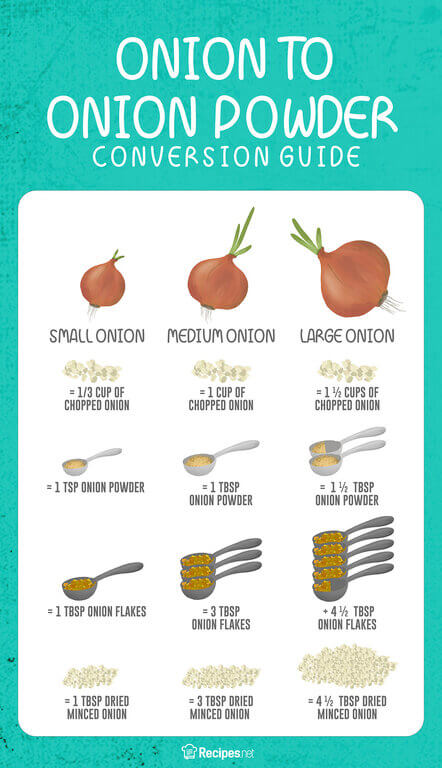
It can be a head-scratcher to estimate how much onion powder to substitute for onions. Some recipes would ask you to chop a medium onion, but how much would that yield exactly? But with the help of our quick conversion chart, you can easily determine how much onion powder equals one onion, as well as measurements for chopped onions, dried minced onion, and dried onion flakes.
If you require bigger quantities of the substitute, it is also useful to know how many teaspoons are in a tablespoon to easily double or triple the amount. Simply put, there are 3 teaspoons in 1 tablespoon. So if you need 1 cup of chopped onions which is equivalent to 1 tablespoon of onion powder, this also means 3 teaspoons of onion powder.
Additionally, onion powder is more potent than the other dried versions. For instance, if the recipe calls for ½ cup of chopped onions, instead of using ½ tablespoon of onion powder, you will have to substitute with 1 ½ tablespoons of onion flakes or dried minced onion. So, if you decide to amp up the volume of your homecooked meals with this substitute, it is best to keep those measurements in mind so as to not overpower your dish.
This onion substitute surely imparts the same onion flavor that you seek. But it’s also important to note that using the powdered kind can slightly change the size of your dish if it calls for big chunks of onions. But that can easily be remedied by doubling up on other ingredients included in the recipe you’re cooking.
How to Make Onion Powder at Home
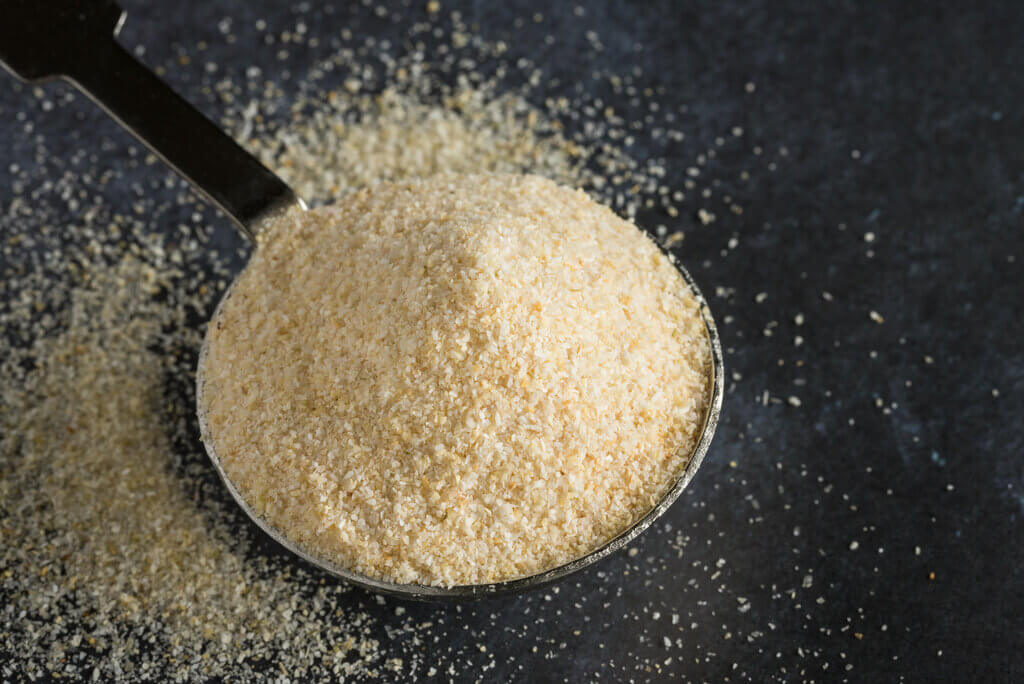
It is easy to just pick up a bottle of onion powder when shopping, but it hits different when you make your own. Making this all-around seasoning won’t cost as much and you get to avoid any additives that storebought ones usually have.
You can use a dehydrator if you have one. Some trusty air fryers can also double as a dehydrator which you can also use. Using a dehydrator guarantees a steady temperature with sufficient airflow. This is ideal to draw moisture out evenly from the food. But using ovens is also a great accessible option for home cooks. Just make sure to prop the door open for better circulation and to prevent the increase in temperature inside. With your preferred kitchen appliance ready, input the appropriate setting and you’re good to go!
You will only need:
- Fresh onion
- Sharp knife or mandoline
- Parchment-lined sheet pan or baking rack
Preparation:
- Peel the skins off the bulbs. Slice the onions carefully using a sharp knife or a mandoline (to get even slices a lot faster). About ⅛ inch of thickness would be good enough for the drying process.
- Place the thinly sliced onions on baking racks (better for airflow) or parchment-lined sheet pans. Spread them in a single layer to ensure they dry evenly.
- Let the slices sit in an oven at 120-150 degrees F (or at its lowest temperature) until dry. If the pieces are still pliable, that means they need a bit more time. Keep the door open slightly to allow for better airflow to ensure that moisture dissipates from the onions.
- Once your onion slices are dried, you can use your handy spice grinders, food processors, mortar and pestle, or even a blender to grind the slices into powder. If you prefer a finer result, use a sifter to get rid of any chunks.
- Store the powder in an airtight container or jar. Keep in a cool dry place in your pantry until you are ready to shake up your tastebuds!
- The dehydration of onions eliminates moisture thus reducing bacteria growth. If stored properly in sealed jars away from direct heat, onion powder can be safe to use for about three to four years!
Never Miss Out on that Yummy Onion Flavor
Using onion powder works great in imparting robustness to your dish. But of course, nothing beats the punch of a fresh one! If you keep running out of onions but don’t want to buy a lot in fear of them going bad and moldy before you get to use them, don’t resort to chucking them in the bin and wasting produce! Alongside dehydrating your onions, freezing chopped onions is also a great way to use up extra onions and extend their shelf life. Now you can easily whip up any dish and not miss out on any flavor!
